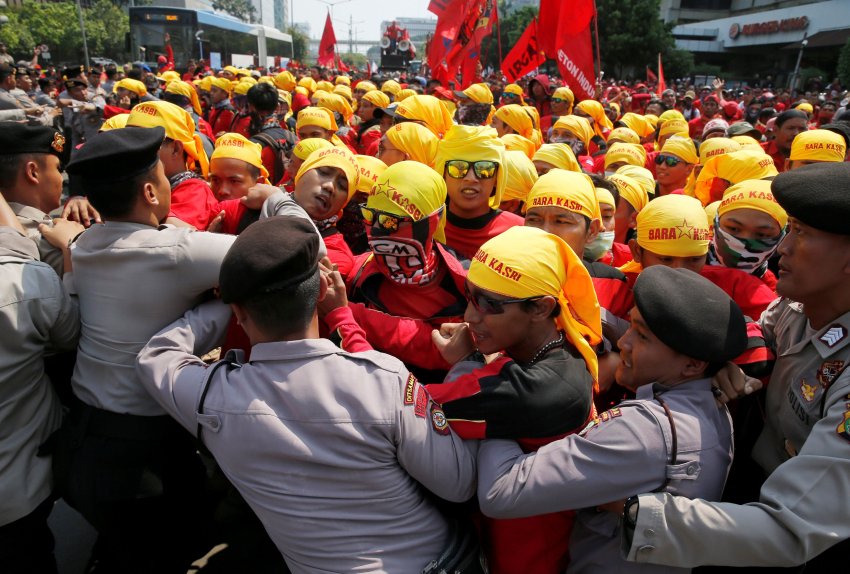
Demonstrations to mark May Day — International Workers’ Day, commemorated globally on May 1 — took place in cities around the world, as workers protested for their rights and celebrated their gains.
Across France, about 150,000 people took part in labour marches, according to government estimates, up slightly on 2017.

Paris.
Trade unions and students’ unions have been rallying against President Emmanuel Macron’s attempt to privatise the state rail operator and restrict access to public universities, as part of a rollback of France's public service.
In neighbouring Spain, thousands marched across Madrid to demand better jobs and pension, waving red union flags and chanting “general strike”.
Demontrators also waved purple flags in support of the feminist movement that is protesting a ruling that cleared five men of gang rape, despite the incident being caught on film.

Madrid.
Several thousand people rallied in the Maltese capital Valletta in a show of support for the government, which is facing judicial inquiries into alleged corruption and European Union questions over the rule of law.
The rally, organised by Malta’s Labour Party, took place two days after demonstrators marched through Valletta chanting anti-government slogans and calling for justice after the killing of anti-corruption journalist Daphne Caruana Galizia.
Organisers said about 20,000 people took part in the rally. The Mediterranean island is the smallest state of the European Union, with a population of 430,000.
In Turkey, thousands of workers rallied in Istanbul, as the city’s iconic Taksim Square remained closed to demonstrators.
Security was tight across Turkey's biggest city, with more than 20,000 members of the security forces deployed to deal with May Day celebrations, according to the Istanbul governor's office. Police said 60 protesters were detained as they tried to defy a ban and march to Taksim Square to celebrate May Day.
Taksim Square was home to May Day celebrations until 1977, when dozens of people were killed during demonstrations, dubbed the “bloody May Day”.

Istanbul.
In Latin America, May Day was a mix of celebrating workers to protesting right-wing governments.
Nearly a million people in Cuba across took part in May Day celebrations to honour workers. In Havana, marchers celebrated former presidents Fidel and Raul Castro, and their newly elected head of state, Miguel Diaz-Canel.

Havana.
Several unions and social movements marched through the streets of Santiago, Chile. Many are demanding the rewriting of the country’s constitution. May Day marches turned violent as protesters were arrested by riot police. The neoliberal Sebastian Piñera administration began cracking down on peaceful student protesters recently who were demanding that university be free.

Santiago.
Huge protests took place in Curitiba, Brazil, where the presidential candidate and former head of state, Luiz Inacio Lula da Silva, is being held on charges of supposedly accepting bribes in the national Car Wash scandal. He has been held in a Curitiba prison since April 7 when the Free Lula campaign began outside the jail demanding his release.

Curitiba.
Large May Day marches took place in Buenos Aires, Argentina out to protest against the Mauricio Macri administration’s drastic austerity measures. Unions and social movements took to the streets to protest measures such as slashing energy subsidies. In two years energy prices have risen, on average by 1000%and inflation hovers at 25%.

Buenos Aires.
Thousands turned out in Mexico’s capital, Mexico City, to demand better working conditions and jobs. The country is gearing up for a presidential election in July. President Enrique Peña Nieto’s popularity rate has sunk to 12%, with his administration marked by corruption and some of the country’s highest homicide rates in 20 years.
A May Day protest against austerity measures in the US Caribbean colony of Puerto Rico turned violent as police hurled tear gas, sending protesters running in the capital of San Juan. The Donald Trump administration did little to help the island’s citizens after two major hurricanes caused widespread destruction amid a debt crisis. Thousands took to the streets to protest the government budget cuts, including proposed cuts to pensions, education and hurricane recovery efforts.
In Venezuela, President Nicolás Maduro spoke to a huge crowd of supporters in Caracas. The day before, Maduro announced an overall 95% salary rise to mark this international commemoration. Maduro said, “It is a brutal economic war that we are going to contain and we will move forward”, referring to the international economic embargo the country faces. The embargo is part of attempts to end the Bolivarian Revolution, now led by Maduro, who is aiming to win presidential elections on May 20.

Caracas.
May Day demonstrations also took place across Asia.
Thousands of people gathered in the Philippines capital, Manila, near the presidential palace, to urge President Rodrigo Duterte to fullfill a campaign promise to end the practice of short-term employment, low wages, overall unemployment and trade union repression.
In South Korea, more than 10,000 people joined a demonstration called by the Korean Confederation of Trade Unions, which demanded a minimum wage rise.
Thousands of workers demonstrated near the presidential palace in Jakarta, Indonesia, to call on the government to end outsourcing and raise wages.

Phnom Penh.
About 2000 workers gathered in Phnom Penh, Cambodia, in a protest organised by a garment union coalition. Riot police were dispatched to prevent the workers from marching on the National Assembly.
[Compiled from TeleSUR English.]